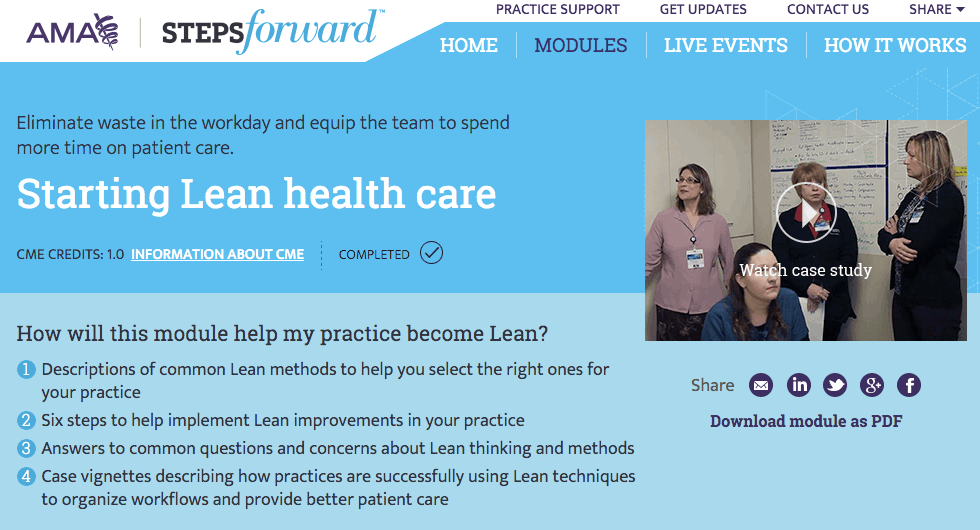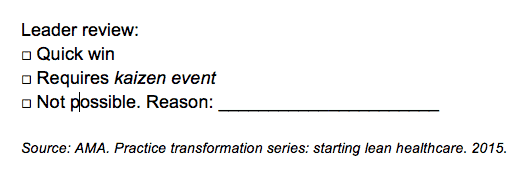Today, I'm sharing a link to some free “Lean 101” material that the AMA has created for physicians.
As I've blogged about before, it took 15 years for the American Medical Association to officially endorse an idea formally proposed in 1915 by Frank Gilbreth, an early industrial engineer. Gilbreth observed that surgeons spent more time searching for instruments than they did performing surgery, so Gilbreth suggested a “surgical caddy” who would keep instruments organized and hand them to the surgeon as needed. We'd take that for granted today.
It's not just the AMA… but it's commonly said that it takes 15 to 20 years for a new practice to be widely accepted as a “best practice” throughout healthcare. It's a cautious, slow moving industry, I guess (see my post about Atul Gawande's excellent article on “fast ideas and slow ideas.”)
I'm not sure when this initiative launched, but I just learned about it… the AMA is offering some online education about Lean in healthcare. You might want to share this link with the physicians in your organization:

The info here is pretty solid. They include a long list of references, including my books.
Their definition of Lean is pretty good:
“Lean” is both a mindset and a method to engage physicians and staff in organizing their practice to run more smoothly. The focus of Lean is to eliminate waste, improve efficiency and add value for the patient.
At least they didn't call Lean a toolbox. I do wish they had more explicitly mentioned quality and safety (they are forms of waste).
I'm happy that they are encouraging everybody to participate in improvement, capturing ideas through their “Team improvement idea worksheet” (Word Doc). They also encourage the use of A3 reports for situations that involve deeper root cause problem solving.
As with the Kaizen templates that I've shared, their worksheet starts with defining the problem. The AMA worksheet asks about root causes, which aren't always a necessary part of the discussion with a very simple Kaizen. They use the term “potential solution,” which is the right thinking. My template says “solution,” but that's partly due to limited space. We have potential solutions, or potential countermeasures, that we TEST… to see if they will work, rather than knowing they will work. Plan, Do, Study, Adjust…
My only suggestion is to not give up too quickly if an idea is “not possible.” From the bottom part of their Kaizen form:

If a particular idea is “not possible,” that shouldn't be the end of the story. Leaders have an obligation to help solve problems, not just reject ideas. We need to brainstorm and find something else we can test… something that IS possible.
Anyway, I think the AMA course is worth sharing… I've sent it to some physicians I know. Maybe you'll do the same. Hopefully, this will help.
Please scroll down (or click) to post a comment. Connect with me on LinkedIn.
Let’s work together to build a culture of continuous improvement and psychological safety. If you're a leader looking to create lasting change—not just projects—I help organizations:
- Engage people at all levels in sustainable improvement
- Shift from fear of mistakes to learning from them
- Apply Lean thinking in practical, people-centered ways
Interested in coaching or a keynote talk? Let’s start a conversation.









